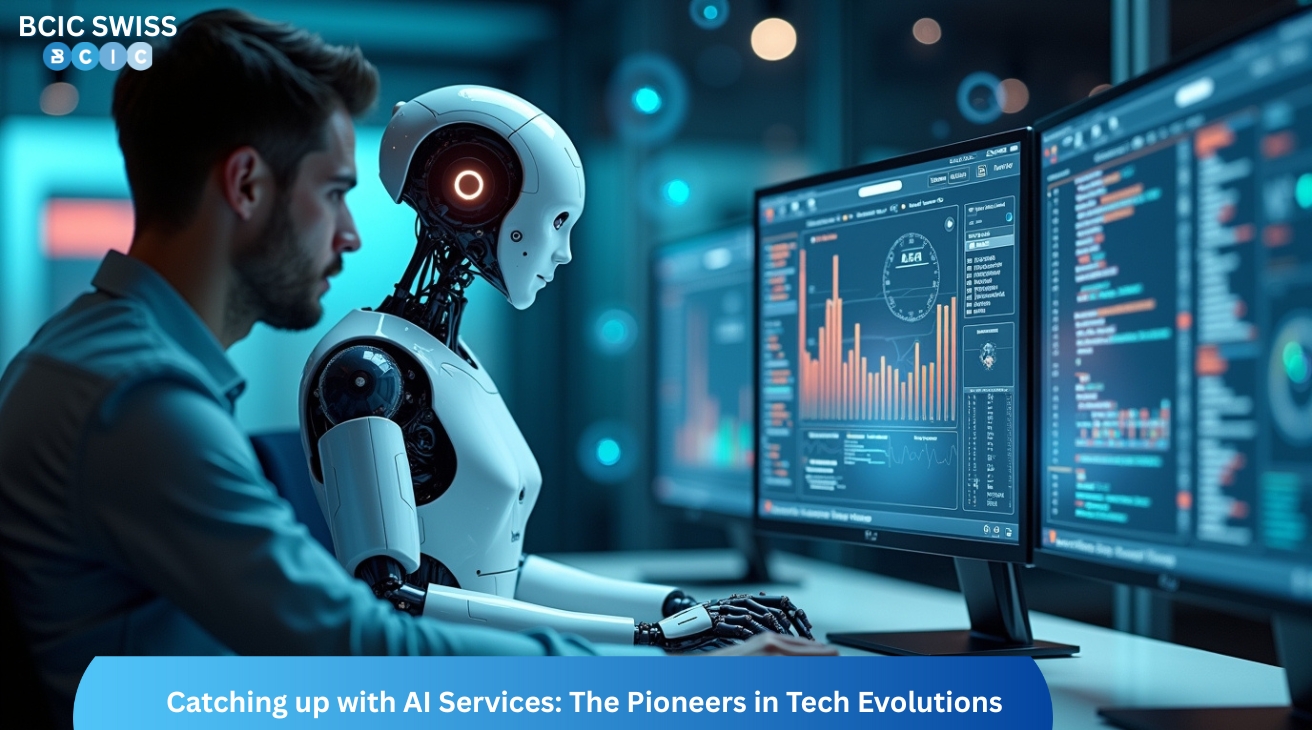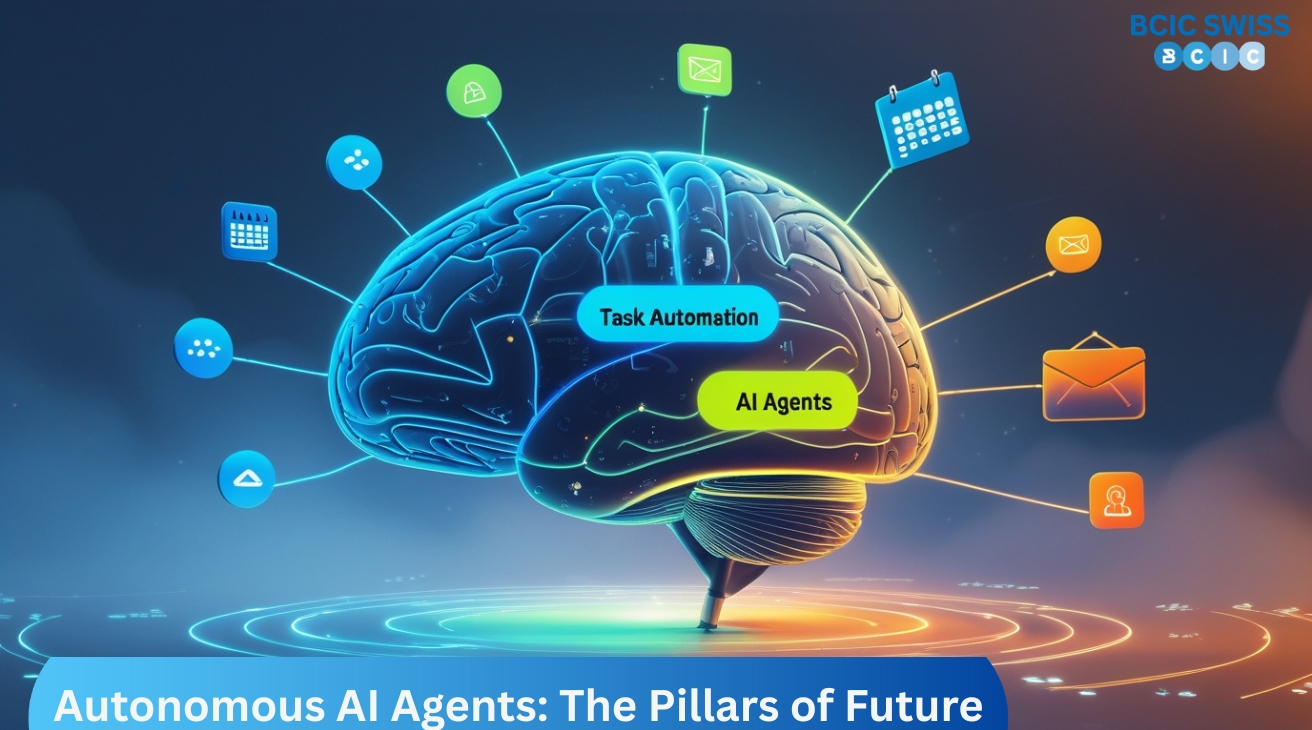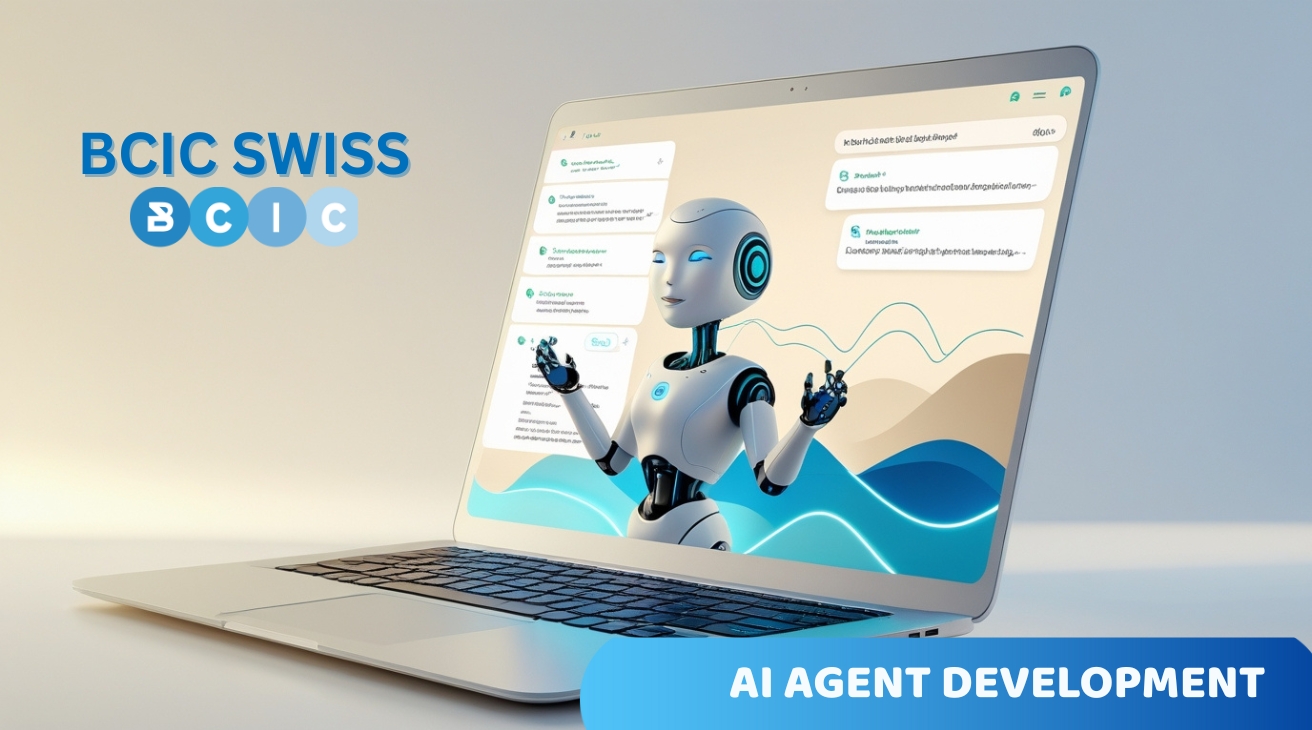AI Agent Development in Switzerland | Top Strategies & Companies
In the ever-evolving world of technology, the development pace of AI agents is staggering, with over $50 billion expected to be poured into AI advancements by 2025. Companies dedicated to AI agent development are not just pushing boundaries; they are transforming industries. Leveraging machine learning, these entities are crafting intelligent solutions capable of revolutionizing everything from customer service to complex data analysis.
AI Agent Development companies have come a long way since the early days of rudimentary algorithms. Today, they integrate sophisticated neural networks and deep learning capabilities to create agents that learn and adapt in real-time. It's fascinating to note that these advancements have nearly halved the time required to train models, making processes significantly more efficient and impactful.
An AI agent development company specializes in creating intelligent systems that can perform tasks autonomously. They leverage advanced technologies like machine learning, NLP, and robotics to build solutions for various industries. These companies focus on enhancing automation, improving efficiency, and enabling sophisticated decision-making processes through AI-driven innovations.
AI Agent Development Company: Revolutionizing Industries
AI agent development companies are making a significant impact on various sectors. They use cutting-edge technologies to create smarter systems that can analyze data and make decisions quickly. This not only improves efficiency but also reduces operational costs. As a result, businesses can stay competitive in a fast-paced market. These advancements are particularly beneficial in fields like healthcare, finance, and manufacturing.
Healthcare is one of the primary industries benefiting from AI agents. These intelligent systems can analyze medical records, predict patient outcomes, and even assist in surgeries. For example, an AI-powered tool can help doctors diagnose diseases more accurately. This leads to better patient care and faster treatments. Additionally, it frees up healthcare professionals to focus on more critical tasks.
In the financial sector, AI agents are transforming how companies handle data and customer interactions. They can detect fraudulent transactions, provide personalized financial advice, and streamline customer service. By integrating these agents, financial institutions can offer better security and improve customer satisfaction. These benefits are crucial in maintaining trust and loyalty among customers.
Manufacturing companies are also leveraging AI agents to enhance productivity. These agents can optimize supply chains, predict equipment failures, and improve quality control. This results in fewer production halts and higher quality products. Moreover, it helps businesses to adapt to changing market demands swiftly. The use of AI in manufacturing paves the way for a more agile and efficient industry.
Delving into the AI Development Landscape
The AI development landscape is vast and continues to expand rapidly. With advancements in machine learning and deep learning, the capabilities of AI systems have grown significantly. Development companies are now using these technologies to create more intelligent and adaptable systems. They focus on producing solutions that can handle complex tasks, making life easier for us all. This rapid growth has sparked increased interest in AI's potential across different sectors.
One of the most exciting aspects of AI development is natural language processing, or NLP. This technology allows machines to understand and process human language, making interactions with computers more natural. NLP has practical applications too, like in chatbots used for customer service. With NLP, these chatbots can understand customer inquiries and provide accurate responses. This improves customer satisfaction and reduces waiting times, benefiting businesses significantly.
AI development also emphasizes the importance of data. Reliable data is the backbone of effective AI systems, allowing them to learn and make predictions. Developers use cloud services and data warehouses to store and analyze massive amounts of information. This data-driven approach ensures AI models are accurate and reliable. Companies paying attention to data management will likely see better outcomes with their AI implementations.
In addition to data, security is a focal point in AI development. AI systems must be secure and compliant with regulations to gain user trust. Development companies are incorporating security measures from the ground up. These include encryptions, regular security audits, and compliance checks. This focus on security safeguards sensitive data and fortifies AI systems against potential threats.

Catching up with AI Services: The Pioneers in Tech Evolutions
AI services have taken the tech world by storm, leading to incredible innovations. Pioneers in this field are not just keeping up with trends but creating them. They focus on developing AI tools that are smarter and more efficient. These advancements help businesses improve their processes and customer experiences. Companies are now able to solve complex problems faster and more accurately.
Major players like Google, Microsoft, and Amazon are at the forefront of AI services. They provide a range of cloud-based AI solutions that are accessible to businesses of all sizes. Using these platforms, companies can integrate AI into their systems without extensive infrastructure changes. This democratization of AI technology means even small businesses can benefit from advanced tools. The impact is significant, leveling the playing field for various industries.
AI services are also transforming customer interactions. With the help of AI chatbots and virtual assistants, companies can provide 24/7 support. These tools use sophisticated algorithms to understand and respond to customer inquiries. As a result, customer satisfaction levels increase, and support teams can focus on more critical issues. This efficient handling of customer queries is becoming a standard in many service-oriented industries.
Moreover, AI is making strides in predictive analytics. Businesses use AI models to analyze data and forecast future trends. This prediction capability helps companies make informed decisions and strategize better. Whether it's anticipating market shifts or managing inventory, AI provides valuable insights. These predictive analytics tools are becoming essential for businesses aiming to stay ahead of the curve.
Emphasizing on AI Development Directions
AI development is moving in exciting new directions, driven by the demands of a digital-first world. One major focus is on enhancing natural language processing (NLP) capabilities. This technology helps computers understand human language more deeply, improving communication between humans and machines. As NLP becomes more advanced, it opens up possibilities for more intuitive and personalized customer interactions. Businesses that leverage NLP can offer better support services and boost customer satisfaction.
Another important direction is using AI to enhance personalized customer experiences. By analyzing user data, AI can deliver tailored recommendations and services. This level of personalization is particularly beneficial in e-commerce, where it can drive sales by suggesting products based on a customer's previous purchases. It also helps companies build stronger relationships with their customers by addressing their specific needs. Personalization powered by AI is quickly becoming an industry standard.
Security and compliance solutions are crucial areas of focus within AI development. Developers are integrating AI tools that can detect threats and ensure compliance with regulations. AI-powered security systems are better at identifying patterns that may indicate a security breach. This proactive approach enhances the safety of information and strengthens trust among users. Organizations prioritizing security are also more likely to avoid costly breaches and maintain customer confidence.
AI development is also heading towards creating autonomous agents. These agents can operate without human intervention, handling tasks ranging from mundane to complex. In industries like logistics, autonomous agents can manage inventory, schedule deliveries, and optimize routes. This autonomy increases efficiency and reduces operational costs. It's a promising advancement that could revolutionize how several industries operate.
The collaboration of multi-agent systems is another emerging trend in AI. These systems can work together to solve complex problems by sharing information and resources. In healthcare, for example, multi-agent systems can improve patient outcomes by coordinating care plans between different specialists. The collaboration ensures efficient use of resources and reduced redundancy in efforts. Multi-agent systems exemplify the concept of teamwork in technology, tackling challenges with collective intelligence.
Exploring AI Security and Compliance Solutions
In the digital world, AI security and compliance solutions are more crucial than ever. As companies rely more on AI, they face the challenge of protecting sensitive data. AI systems must be equipped to identify potential threats and vulnerabilities. By doing so, they can prevent data breaches and unauthorized access. Ensuring data protection builds user trust and compliance with industry regulations like GDPR and HIPAA.
AI technologies are increasingly used to detect security threats faster than traditional methods. AI security systems can monitor network traffic, analyze patterns, and flag unusual activities. Some of the key features include real-time alerts, automated responses, and detailed reports. With these capabilities, businesses can quickly address issues before they escalate. This proactive approach is essential in staying ahead of evolving cyber threats.
Compliance solutions aided by AI can simplify adherence to regulatory requirements. AI can automatically check if company practices comply with relevant laws. This reduces the need for manual checks, saving time and resources. It also minimizes the chances of human error, which can lead to costly fines. AI-driven compliance fosters a culture of accountability and transparency within organizations.
Integrating AI security measures involves using encryption, access controls, and regular audits. Encryption ensures data is unreadable to unauthorized users. Access controls limit who can view or modify sensitive information. Regular audits help identify gaps in security and ensure compliance standards are maintained. Having these layers of security increases overall protection.
The role of AI in compliance also extends to financial reporting. AI can analyze transactions for discrepancies and ensure reports are accurate. In case of irregularities, AI systems can alert relevant personnel immediately. Accurate financial reporting is crucial for investor trust and regulatory compliance. AI solutions streamline the reporting process and enhance data reliability.
Understanding the Role of Conversational AI and Virtual Assistants
Conversational AI and virtual assistants are transforming how we interact with technology. These systems are designed to understand and respond to human language, making our digital experiences smoother. From answering customer queries to providing personalized recommendations, they are becoming a staple in both personal and business settings. Their ability to process natural language and context enables more natural, human-like interactions. This makes technology accessible to a broader audience.
Virtual assistants like Siri, Alexa, and Google Assistant are now common in many households. They help with everyday tasks, like setting reminders, playing music, or controlling smart home devices. These assistants use sophisticated algorithms to understand voice commands and execute them accurately. Additionally, they can learn user preferences over time, becoming more efficient and helpful. This convenience has made them an integral part of modern living.
In businesses, conversational AI plays a crucial role in customer service. AI-powered chatbots can handle multiple customer interactions simultaneously, providing timely support. They can answer FAQs, help with account information, and even process transactions. This not only improves customer satisfaction but also reduces the workload on human agents. Companies benefit from cost savings and increased efficiency.
The technology behind conversational AI involves natural language processing (NLP) and machine learning. NLP helps the AI to interpret and generate human language. Machine learning enables the system to learn from interactions and improve accuracy over time. These technologies work together to create responsive and adaptive AI systems. As a result, conversational AI continues to evolve, becoming more accurate and useful.
Conversational AI is also used in areas like healthcare, finance, and education. In healthcare, it can assist with scheduling appointments and providing medical information. In finance, it helps with managing accounts and transactions. In education, AI tutors offer personalized support to students. These applications showcase the versatility and potential of conversational AI in various fields.

Autonomous AI Agents: The Pillars of Future
Autonomous AI agents are reshaping the future by taking on tasks without human intervention. These intelligent systems can independently perform a range of jobs, from customer service to complex data analysis. They learn and adapt through machine learning, which helps them get better over time. This ability makes them invaluable in various sectors. Their independence reduces the need for constant human oversight.
In the logistics industry, autonomous AI agents are revolutionizing operations. They optimize routes for delivery trucks, manage inventories in real time, and predict supply chain disruptions. By doing so, they help companies save money while improving efficiency. For example, an autonomous agent can immediately reroute deliveries if there's unexpected traffic or weather conditions. This agility keeps businesses running smoothly regardless of external factors.
The healthcare sector also benefits significantly from these agents. Autonomous AI systems monitor patient health data around the clock, providing early warnings about potential issues. They assist doctors in diagnosing diseases by analyzing medical records quickly and accurately. Additionally, these systems can schedule appointments and even interact with patients to make healthcare more personalized and accessible. This constant monitoring helps improve patient outcomes.
In manufacturing, autonomous AI agents ensure production lines run continuously and efficiently. They identify machinery defects before they cause downtime and adjust workflows based on real-time data. This leads to higher productivity and less waste in materials and resources. By predicting problems before they arise, companies can maintain high standards while reducing costs.
Financial services are another area where autonomous AI agents shine. They oversee transactions to detect fraudulent activities almost instantaneously. With this level of vigilance, financial institutions can safeguard assets more effectively than ever before.
AI-Powered Business Process Automation: A Glimpse into the Future
AI-powered business process automation is transforming how companies operate. By automating repetitive tasks, AI allows employees to focus on more strategic activities. This not only improves efficiency but also boosts overall productivity. For example, AI can handle data entry, customer inquiries, and inventory management with minimal human intervention. As a result, businesses can achieve more with fewer resources.
One of the significant benefits of AI in business process automation is its ability to analyze vast amounts of data quickly. Companies collect a tremendous amount of data daily, and AI helps make sense of it all. By processing this data, AI provides actionable insights that drive better decision-making. This data-driven approach helps businesses stay competitive in a fast-paced market. Leaders can make informed decisions based on real-time information.
AI-powered automation is also making strides in the area of customer service. With AI chatbots and virtual assistants, businesses can offer 24/7 support. These systems can handle basic customer queries, process orders, and even troubleshoot issues. This continuous availability enhances the customer experience, leading to higher satisfaction and loyalty. Automation in customer service ensures that no customer query goes unanswered.
In the financial sector, AI automates tasks like compliance checks and fraud detection. These processes are often time-consuming and require a high level of accuracy. AI systems can perform these tasks faster and more accurately than humans. This reduces the risk of errors and ensures compliance with regulations. Financial institutions can operate more efficiently and securely.
Manufacturing is another industry benefiting from AI-powered automation. Automated systems can monitor production lines, detect defects, and predict maintenance needs. This predictive maintenance helps in reducing downtime and extending the lifespan of machinery. The result is a more efficient and cost-effective production process. Businesses can maintain high-quality standards while optimizing their operations.
Benefits of Our AI Software Development Solutions Across Industries
Our AI software development solutions offer significant benefits to a variety of industries. In healthcare, AI helps with diagnostics and treatment planning, making healthcare more efficient and effective. By analyzing patient data, AI can assist doctors in providing accurate diagnoses faster. This results in better patient outcomes and streamlined operations. Additionally, AI applications improve the management of medical records.
In the financial sector, our AI solutions enhance security and compliance. AI tools can detect fraudulent activities in real-time, reducing the risk of financial crimes. These tools also ensure compliance with regulatory standards by continuously monitoring transactions. This saves time and reduces the manual effort required for compliance checks. Financial institutions benefit from reduced risks and improved trust.
The real estate industry also gains from AI development. AI-powered systems can analyze market trends and property values, providing accurate forecasts. This helps buyers and sellers make informed decisions. Using AI, real estate agents can offer personalized property recommendations based on customer preferences. This level of customization leads to a better client experience. AI streamlines processes, making property transactions smoother and faster.
Manufacturing is another industry where AI shows immense benefits. AI-driven automation optimizes production lines, reducing errors and increasing output. By predicting equipment failures, AI ensures maintenance is done proactively, preventing downtime. This increases the lifespan of machinery and improves production efficiency. Manufacturers can maintain high-quality standards while minimizing operational costs.
Logistics companies are using AI to optimize their supply chains. AI systems can analyze shipment data, predict delivery times, and optimize routes. This results in faster deliveries and reduced transportation costs. AI also helps in warehouse management by optimizing inventory levels. By using AI, logistics companies can improve their overall efficiency and customer satisfaction.
Insurance companies benefit from AI through more accurate risk assessments and faster claims processing. AI can analyze vast amounts of data to predict potential risks and set premiums accordingly. This leads to more accurate pricing models and reduced chances of fraud. AI also speeds up the claims process by automating document verification and assessment. These advancements lead to better service and reduced costs.

Why BCIC SWISS is Your Next-Gen AI Development Partner
BCIC SWISS stands out as a leading AI development partner due to its extensive expertise. With a strong foundation of industry knowledge, they deliver cutting-edge AI solutions tailored to your needs. The team consists of skilled professionals who understand complex AI systems. By choosing BCIC SWISS, businesses can access high-quality AI software development services. This expertise ensures projects are completed efficiently and effectively.
Collaboration is at the heart of BCIC SWISS's approach. The company works closely with clients to fully understand their goals and challenges. This transparent communication helps in crafting solutions that meet specific business objectives. With offices in Switzerland, Poland, the USA, Germany, and the Netherlands, clients benefit from a global perspective. Teams align with different time zones, ensuring seamless collaboration.
BCIC SWISS leverages advanced technologies to stay ahead in AI development. By using tools like Python, R, and various cloud AI services, they ensure state-of-the-art solutions. These technologies offer versatility and reliability across different industries. With a commitment to utilizing the best resources, BCIC SWISS provides robust and scalable AI systems. Businesses can depend on these technologies for innovative solutions.
Dedicated to security and compliance, BCIC SWISS incorporates these aspects into every project. AI systems are developed with data protection and regulation adherence in mind. This focus on security ensures client data remains safe and compliant with industry standards. By prioritizing these elements, BCIC SWISS builds trust with their clients. This commitment to security sets them apart from competitors.
BCIC SWISS's track record of successful projects speaks for itself. With numerous clients across different sectors, they have proven their capability time and again. Their agile methodologies ensure quick adaptation to changing requirements. This flexibility makes them an ideal partner for businesses looking to innovate. Choosing BCIC SWISS means having a reliable partner in achieving AI development goals.
Exploring Technologies Powering the AI Services
The technologies behind AI services are constantly evolving, making them more powerful and efficient. At the core of AI development are programming languages like Python and R. These languages are popular due to their versatility and ease of use. They allow developers to create complex AI models and algorithms. Also, their strong community support ensures continuous improvement.
Cloud AI services play a crucial role in powering AI solutions. Platforms like AWS Sagemaker, Azure AI, and Google Cloud AI provide the infrastructure needed to build, train, and deploy AI models. These services offer scalability, making it easier for businesses to handle large datasets. Additionally, using cloud platforms reduces the need for extensive on-site hardware. This accessibility helps companies of all sizes to implement AI technologies efficiently.
Data analytics and business intelligence tools are essential components of AI services. Tools like Google Analytics, Looker Studio, and Power BI help in analyzing and visualizing data. These tools turn raw data into actionable insights that drive decision-making. With these technologies, companies can better understand their operations and customer behaviors. Enhanced data analytics leads to improved strategies and outcomes.
Data storage solutions are another key aspect of AI technology. Data lakes and warehouses like AWS S3, Azure Data Lake, and Google BigQuery offer secure and reliable storage options. These platforms enable the handling of vast amounts of data necessary for training AI models. Proper data management ensures the accuracy and performance of AI systems. This robust infrastructure is critical for successful AI implementations.
Machine learning frameworks like PyTorch and TensorFlow are also vital in AI development. These frameworks provide tools and libraries for building and training machine learning models. They support a wide range of applications, from image recognition to natural language processing. Using these frameworks, developers can create sophisticated AI solutions. They are the backbone of developing advanced and effective AI services.
Demystifying Common Queries: AI Development Processes Explored
AI development is often seen as complex, but breaking it down can make it more understandable. It starts with gathering and preparing large amounts of data. Data is crucial because it helps the AI system learn patterns. This process involves cleaning and labeling data to ensure accuracy. Without quality data, AI systems can't function effectively.
Once the data is ready, developers choose the right machine learning model. Models are algorithms that help the AI learn from the data. Popular models include decision trees, neural networks, and support vector machines. The choice depends on the specific task, such as image recognition or speech processing. Picking the right model is key to the success of the AI application.
Training the model is the next step. During training, the model processes the data and identifies patterns. This stage requires significant computing power and time. Developers use tools and frameworks like TensorFlow to make this easier. The goal is to create a model that can accurately predict or categorize new data.
After training, models need to be tested and validated. Testing ensures that the AI system works correctly and can handle real-world situations. Developers use a portion of the data to evaluate the model's performance. If errors are found, they refine the model by adjusting parameters or adding more data. This iterative process is essential for producing a reliable AI system.
Finally, deploying the AI system involves integrating it into existing applications or platforms. This step requires careful planning to ensure smooth operation and user interaction. Continuous monitoring is necessary to maintain performance and identify any issues. By understanding these processes, businesses can effectively implement AI to improve their operations.
Frequently Asked Questions
AI agent development is instrumental in revolutionizing various sectors by introducing autonomous solutions that enhance efficiency. These agents, powered by machine learning and advanced data analysis, are creating significant shifts in how tasks are approached and executed across different industries.
1. What industries benefit most from AI agents?
AI agents are particularly beneficial in industries like healthcare, finance, and logistics. In healthcare, they assist with diagnostics and patient management, improving outcomes through data analysis and pattern recognition. Finance industries use AI agents to detect fraud and automate customer service tasks, enhancing both security and efficiency.
Logistics companies benefit by optimizing supply chain processes, predicting delivery times, and managing inventory efficiently. AI agents in these sectors streamline operations, reduce human error, and improve decision-making capabilities, making processes faster and more reliable.
2. How do AI agents enhance customer experiences?
AI agents enhance customer experiences by providing personalized and timely support through chatbots and virtual assistants. These tools can handle a myriad of customer inquiries, automate responses, and offer solutions promptly, reducing wait times and increasing customer satisfaction.
Beyond immediate responses, AI agents analyze customer data to provide personalized recommendations, tailoring services to individual preferences. This level of customization helps businesses build stronger relationships with their clients, fostering loyalty and trust.
3. What challenges do companies face in AI agent adoption?
Despite their advantages, adopting AI agents can pose challenges, such as high initial costs and technical complexity. Companies need to invest significantly in infrastructure and skilled personnel to implement AI solutions effectively, which can be a barrier for smaller businesses.
Moreover, integrating AI systems with existing processes can be complex, requiring thorough planning and adjustments. Ensuring data privacy and compliance with regulations adds another layer of complexity that businesses must manage to avoid legal issues.
4. How do AI agents handle data privacy concerns?
AI agents use advanced encryption and access controls to protect data privacy and ensure compliance with regulations like GDPR. By restricting unauthorized access and providing transparency in data processing, companies can build trust with their users.
Regular audits and updates are part of maintaining data privacy within AI systems. By regularly reviewing security protocols, businesses can adapt to new threats and ensure that their AI agents remain secure and compliant over time.
5. What future advancements are expected in AI agent technology?
As AI technology continues to evolve, future advancements in AI agents may include enhanced natural language processing capabilities and more sophisticated machine learning models. These improvements could lead to even more intuitive and autonomous systems capable of performing complex tasks with greater accuracy.
Additionally, we can expect AI agents to have increased integration with IoT devices, providing comprehensive solutions that span multiple platforms and services. This will further broaden their application across different industries, leading to smarter, interconnected systems.
Conclusion
In summary, AI agent development companies are paving the way for innovative solutions across various industries. They provide smarter, more efficient systems that handle complex tasks autonomously. As technology advances, the potential for AI agents to revolutionize our daily operations continues to grow.
With the right implementation, businesses can leverage AI to enhance customer experiences, improve operational efficiency, and maintain data security. The future of AI agent technology holds promise for even greater integration and capabilities. This makes it an exciting time to be part of this transformative field.


























